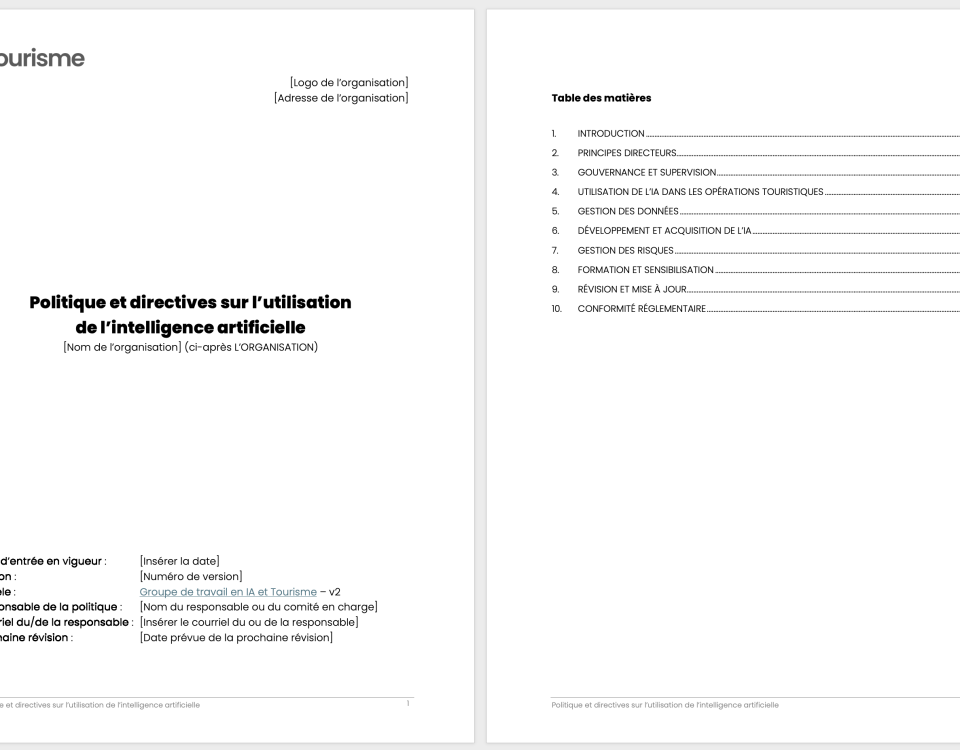
Top 5 AI tools applicable to tourism
12/06/2024
What the Rencontres E-Tourisme de Pau taught us about AI and the tourism of tomorrow
24/10/2024In the ever-changing world of tourism, offering an exceptional customer experience has become a crucial element in standing out from the competition. Today’s travelers are more demanding, looking for personalized, fast and efficient services. This is where artificial intelligence (AI) comes in, offering innovative solutions to transform every stage of the customer journey.
AI, with its advanced data analysis and machine learning capabilities, enables tourism companies to anticipate customer needs, personalize interactions and automate repetitive tasks. This is no longer science fiction: chatbots responding instantly to customer requests, personalized recommendations based on previous preferences, and automated check-in processes are already a reality in many companies.
Imagine a near-future where every interaction with a customer is optimized by artificial intelligence, creating a smooth, rewarding experience. Hotels can anticipate their guests’ preferences before they even arrive, tourist attractions can offer immersive guided tours thanks to augmented reality, and travel agencies can offer tailor-made itineraries based on each traveler’s individual interests.
Implementing AI in the tourism sector isn’t just about improving customer service. It also opens the door to more effective resource management, greater operational efficiency, enhanced security and better feedback management, enabling companies to adapt quickly to changing market needs. For example, thanks to predictive analysis, companies can anticipate peak periods and adjust their operations accordingly, guaranteeing optimal service at all times.
AI technologies also make it possible to collect and analyze massive amounts of customer data, offering valuable insights that can be used to continually improve services. In other words, AI doesn’t just meet customer expectations – it exceeds them.
How AI can improve the customer experience

Artificial intelligence (AI) plays a key role in this transformation, enabling companies to improve their services in innovative and efficient ways. Here are 8 concrete ways to optimize customer experience with AI in your organizations:
1. Chatbots for 24/7 Support
AI-powered chatbots enable tourism businesses to provide instant assistance to customers around the clock. These virtual assistants can answer common questions, provide booking information and even help solve problems in real time.
2. Personalized recommendations
AI can analyze customer data to offer personalized recommendations. For example, a hotel reservation system might suggest activities or restaurants based on the customer’s past preferences. This creates a more enriching, tailored experience for each visitor.
3. Automated check-ins and check-outs
Hotels can use AI to automate check-in and check-out processes, reducing queues and improving efficiency. Customers can use self-service kiosks or mobile apps to manage their stay without having to interact with staff.
4. Predictive Analysis for Resource Management
AI can predict booking trends and help companies manage their resources more effectively. For example, it can predict peak periods and adjust staff accordingly, guaranteeing optimal service even during peak periods.
5. Automated Feedback Systems
AI-based feedback systems can collect and analyze customer opinions in real time. These systems enable companies to react quickly to feedback and make continuous improvements to their services, thereby increasing customer satisfaction.
6. Personalizing the On-site Experience
At tourist attractions, AI can be used to personalize the on-site experience. For example, mobile applications can offer personalized visit itineraries or contextual information based on visitors’ preferences and behavior.
7. Augmented and Virtual Reality
AI can enrich augmented reality (AR) and virtual reality (VR) experiences by offering interactive and immersive guided tours. Tourists can explore historic sites or remote destinations virtually, adding a new dimension to their travel experience.
8. Improving safety
AI can also play a crucial role in customer safety. For example, intelligent surveillance systems can detect abnormal behavior and alert security personnel, ensuring a safer experience for visitors.
Conclusion: A Promising Future with AI in Tourism

The adoption of AI in the tourism sector is not limited to these eight points. The possibilities are vast and continue to grow, paving the way for even more impressive innovations. Whether through virtual reality for immersive tours or intelligent voice assistants for instant recommendations, AI is constantly pushing the boundaries of what’s possible. Companies that adopt these cutting-edge technologies can position themselves at the forefront of innovation and differentiate themselves in an increasingly competitive market.
By integrating AI, tourism businesses can not only improve operational efficiency but also deliver an exceptional and memorable customer experience. AI makes it possible to personalize interactions to an unprecedented level, anticipate customer needs and offer them tailor-made services. This ability to exceed customer expectations creates increased loyalty and high customer satisfaction, essential factors for long-term success in the tourism sector.
Finally, AI integration is not just a question of technology, but also of strategic vision. Companies need to consider how these innovations can transform their business model and give them a sustainable competitive advantage. By embracing AI, tourism businesses can not only meet customers’ current expectations but also anticipate future needs, ensuring their relevance and success in an ever-changing landscape. The future of tourism is undoubtedly linked to artificial intelligence, and those who adapt now will be the leaders of tomorrow.



